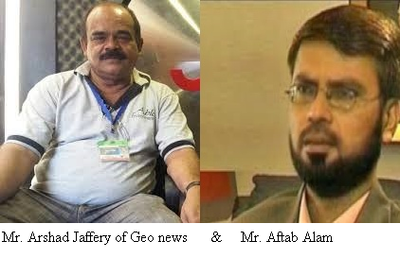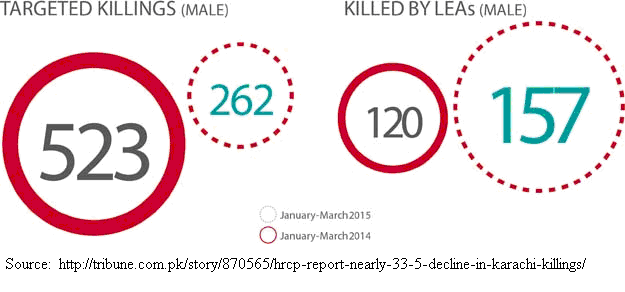A new wave of target killings of journalists and attacking on the media houses have again started. With in the span of 24 hours two media persons were killed by, as usual, “unknown persons”. The score comes to five during the current year. According to Dunya Tv during the last five years 65 journalists were killed in Pakistan and still no precautions were taken to protect the journalists by the government and media houses themselves.
On September 9, two unidentified armed men shot dead senior journalist Aftab Alam on in a drive-by shooting incident in the city’s North Karachi area. According to media reports Alam was shot dead by unidentified assailants outside his house. The senior journalist was critically injured in the attack and was rushed to the Hospital, where he was pronounced dead.
 On September 8 in evening another media man, Mr. Arshad Ali Jaffery, of Geo News channel was attacked while he was sitting with his driver in a DSN van. As usual the three unknown attackers came on a motor bike and did indiscriminate firing targeting Jaffery. He received nine bullet shots and driver received two bullets. He died in hospital. The Geo news always remains under attack from political groups and the authorities
On September 8 in evening another media man, Mr. Arshad Ali Jaffery, of Geo News channel was attacked while he was sitting with his driver in a DSN van. As usual the three unknown attackers came on a motor bike and did indiscriminate firing targeting Jaffery. He received nine bullet shots and driver received two bullets. He died in hospital. The Geo news always remains under attack from political groups and the authorities
It has been two years since the Karachi operation against extortionist and target killers began in Karachi yet so far there has not been any major improvement in the law and order situation in the metropolis of Karachi, the provincial capital of Sindh province, Pakistan. Organized crimes, gang war between militia groups maintained by political parties and target killings have cost the economic hub of the country billions of Dollars.
Assessing the law and order situation in Karachi, a fact-finding mission of the Human Rights Commission of Pakistan (HRCP) concluded, on July 21, 2014, that the operation launched in September 2013 had failed, and that the “objectives of the operation have not been met”. HRCP Secretary General I.A. Rehman lamented that the operation had been launched on an “ad hoc basis without appropriate planning,” he noted,
“Throughout the operation nothing has been done to enhance the capacity of the Police, with the result that the ad hoc measure has essentially become open-ended and indefinite. A working chemistry that should have been there between the Police and Rangers was still missing. The Police were not conducting any operation in Karachi but were merely engaging in proactive policing.”
The recent cases of target killing negate the tall claims of police officers who report that that the trend in target killing has decreased by 70 percents. According to media reports 112 people were killed in the month of August alone. The figure included the attack on political leaders Dilshad Mavia of the Ahle Sunnat Wal Jamaat (ASWJ) and Rasheed Godil a political leader of Muttaida Qaoumi Movement (MQM) and sitting member of the National Assembly. Mavia was shot dead in an act of targeted killing in Orangi Town on 18th August while Mr. Rasheed Godil survived the attempt on his life by target killers.
The case of slain activist Sabeen Mehmood suffered a setback when her driver Ghulam Abbas was shot death by unknown assailants. Abbas was the main witness in the case and had identified the assailants who killed Sabeen. According to police officials investigating the case, strong evidence of banned outfit’s involvement in Sabeen’s murder has been found. The murder brings to light the state’s disinterest in witness protection. The assailants are subsequently acquitted for want of evidence and witness in such cases where the star witness are killed or threatened into silence.
As per the stats collected by Human Rights Commission (HRCP) of Pakistan that states that while numbers for targeted attacks and killings had gone down in Karachi, street crimes such as robberies had increased.

From the stats available it appears that though target killing has reduced by 49% the number of death in encounter have increased by 30percents. The Karachi operation began without any coherent strategy chalked out to strengthen the civil system of policing as paramilitary forces were literally given control of the whole city resulting in human right violation and rise in extra judicial killings. The term of rangers was initially said to be one year however I has now been extended indefinitely.
The Pakistan rangers in Karachi are overstepping their mandate by arresting political leaders involved in corruption. The focus of the Karachi operation seems to have veered away from its original mandate-weeding out terrorist- to political vengeance. The anti-terrorism law has been used to apprehend a growing number of individuals such as the chairman of the Fishermen Cooperative Society, to the head of the country’s largest association of builders and developers, to various officials of the city government.
The solution to Karachi’s law and order situation lies not in targeted operation but in political dialogue but on the personal instructions of chief of army staff, General Raheel Sharif, a ruthless operation has been started which is now targeting political workers rather than terrorists. This is the reason the banned militant groups again find liberty to operate freely without any fear. Though the operation may cause a temporary lull in the otherwise volatile city the calm will be short lived. The absence of political co operation and strong local body governance has made Karachi on of the deadliest cities in the world. Rangers and other paramilitary are mainly targeting the political parties however an across the board action against the banned outfit is also needed as many sleeper cells of these banned groups are still operating. Two years down the line the operation has lost its focus and perhaps even sense of purpose the figures as propounded by the ranger are a mere eye wash to perpetuate their control over the city. The state must take coherent steps to strengthen state institution rather than outsource control to the military and Para military forces which might result in state relapsing to dictatorship.